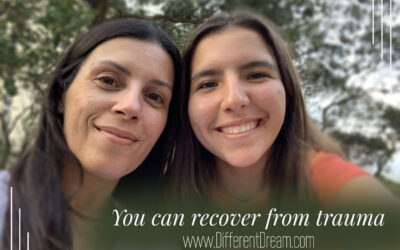Coping Mechanisms for Traumatized Parents of Kids with Special Needs, Pt. 5

Thanks for stopping by Different Dream to check out our question and answer series about special needs parenting stress, trauma, and PTSD. It continues to move full steam ahead in 2016. Here’s a quick recap of what’s been covered so far. The first post introduced the series, while the second explained the difference between trauma and PTSD. The third post answered two question: Can the stress of raising a child with PTSD result in a parent with PTSD? What other kinds of parenting trauma can lead to PTSD? In the fourth post, child psychologist Liz Matheis explained how hypervigilance can be both a cause and a symptom of PTSD in stressed-out parents of kids with special needs.
In this post, Matheis answers some very practical questions submitted by the mom of a child with significant special needs. What are some tools or coping mechanisms when I feel anxiety building? What should I do when I find myself remembering the traumatic events that led to my PTSD? As you will see, Dr. Matheis answers these practical questions with some equally practical advice.
You may find your anxiety is being triggered by the day’s events, or what you still need to accomplish before the day’s end for yourself, your child, your job, or all three. That anxiety experience is real, and it sometimes triggers a more intense anxiety response when something isn’t going as you planned. And let’s face it, there are a lot of variables that can go out of whack at any given time!
First and foremost, embrace how you are feeling even if there is no real identifiable source for your anxiety. When feeling distressed, acknowledge your feelings and don’t try to deny, distract, or run away from them. Today’s trigger may have been a sudden flashback, a scent, a sight, or a feeling. It’s okay.
Secondly, allow yourself to leave the situation you are in and take a break. Do not force yourself to stay or handle a situation your tolerance and resources are at a minimum. Find a quiet place, make a cup of tea and allow your body to process your emotions and come back down from the roller coaster ride you just took.
Thirdly, keep a journal with you, or find a phone app that you can use to write down your thoughts and feelings in that moment. Answer these questions honestly as you write: What is it that you are feeling? Why do you think you are feeling this way? Have you felt this way before? When did you feel like this before? What are you thinking of? The answers to any of these questions will give you insight into how the current situation is resulting in flashbacks and the experience of anxiety.
Bottom line, do not try to run away or hide from the anxiety you are feeling or the memories. Feed your body and mind the message that, ‘It’s okay to feel like this,” and “You will get through this.”
Your Questions about Parenting Trauma and PTSD
Do you have questions about the coping mechanisms Dr. Matheis outlined above? Or do you have other questions about parenting trauma, stress, and PTSD? If so, you’re invited to leave them in the comment box for Dr. Liz.
Do you like what you see at DifferentDream.com? You can receive more great content by subscribing to the quarterly Different Dream newsletter and signing up for the daily RSS feed delivered to your email inbox. You can sign up for the first in the pop up box and the second at the bottom of this page.

By Liz Matheis
Dr. Liz Matheis is a clinical psychologist and school psychologist in Parsippany, NJ. She offers support, assessments, and advocacy for children who are managing Autism Spectrum Disorders, ADHD, learning disabilities, and behavioral difficulties, as well as their families. She is also a contributor to several popular magazines. Visit www.psychedconsult.com for more information.
1 Comment
Submit a Comment
Subscribe for Updates from Jolene
Related Posts
Trauma vs. Trust
For special needs parents, figuring out trauma vs. trust becomes the difference between enduring life and enjoying it.
Flying Near the Sun as a Special Needs Parent
Guest blogger Lisa Pelissier explains how she copes when she is flying near the sun as a special needs parent.
How Can I Make You Feel Safe?
Whether your loved one suffers from trauma or dementia, the best question a caregiver can ask is, “How can I make you feel safe?”






Embrace how you are feeling in the moment is such great advice because sometimes we try to run away from it and that is far from helpful. It will not solve anything! Thanks for sharing this important and helpful info!